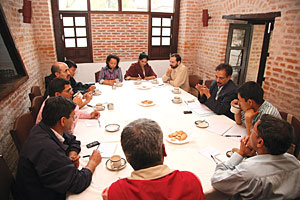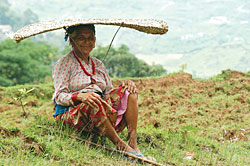 MIN RATNA BAJRACHARYA |
Ngamindra Dahal (National Trust for Nature Conservation): Conflict over natural resources is possible in a country like ours. Due to the dry winter this year, people from two villages in Mustang who get water from the same stream, got into fight. The locals of Belghari, Sindhuli district were forced to leave the village after the water source dried up in winter.
Santosh Mani Nepal (World Wide Fund for Nature): Resources like forests, water, mines, land and energy should be managed sustainably. The ongoing debate on state restructuring should not just take into account ethnicity and language but also natural resources.
Naya Sharma Poudel (Forest Action Nepal): Ninety per cent of Nepal's population depends directly on natural resources for subsistence. It is the base of the economy, therefore how these resources are shared should be an important part of the new constitution. The productivity and sustainable management of resources depends on its distribution, and we should learn from past experience.
Jagat Deuja (Community Self-Reliance Centre): Unequal distribution of natural resources, can be the cause of conflict. Dalit, Janajati, women and marginalised communities should be given fair access to resources.
Yamuna Ghale (Swiss Agency for Development and Cooperation): The formation of the 'delineation committee on natural resources, economic rights and structure of constitutional body' in the CA has highlighted the importance of natural resources. Socio-economic change is possible through proper management of land, water and forest. If we don't heed this there is bound to be conflict.
Kamala Sharma (HIMAWANTI-Nepal): A handful people in society exercise control over natural resources. Land to the tiller has never been implemented, even though we have debated it enough. Social transformation is possible only if the resources are distributed evenly and everyone has a share.
Dilaraj Khanal (Federation of Community Forest Users): There has not been enough discussion on what kind of rights we want over natural resources. At a time when the discussion has begun
on constitution content, the issue of resources has been overshadowed.
Naya Sharma: There has to be restructuring of the rights of citizens and the state over resources. Federal units could overlook environment issues.
For instance, the money DDCs earn from quarry royalty is much less than the environment cost. It will invite conflict in the long run.
Jagat Deuja: The rights of water, forest, land at the centre, province, local and community level should be clear in the constitution.
Santosh Nepal: If the upper Karnali builds a dam, the lower Karnali will be affected. We must be sensitive to such issues. The products of resources should be taken into consideration while creating provinces.
Yamuna Ghale: Most lawmakers are concerned about territory, not about rivers and forests. This indicates a lack of common understanding.
Dilraj Khanal: There could be conflict between the centre, province and local authority over natural resources. The constitution should mention that the local community will be given the management of local resources.
Naya Sharma: Everyone speaks of rights over resources. But what about the responsibilities we have? There has to be devolution of rights from the centre to the provincial government, which will further pass the rights to local communities.
Santosh Nepal: Duty comes with rights. If the Botes get the right to fish in Rapti river, their duty is to ensure the rights of crocodiles to live there. In a federal system,
rights and responsibilities go together.
Kamala Sharma: There is no consensus on how to distribute land, water and forest even after many rounds of talks with lawmakers and committee members and experts. The committees concerned should focus on the rights of women, Janajatis and consumers of natural resources.
Yamuna Ghale: Ensuring the rights of women, Janajatis, Dalit and other marginalised communities can ensure the rights over natural resources as well. For example, if a single woman gets a land ownership certificate, there will be a reduction in discrimination against women.
Confused ideology
It is vital that the constitution addresses the needs of the people at a grass roots level
BHARAT KUMAR POKHAREL
 MIN RATNA BAJRACHARYA |
This signals confusion in ideology regarding who will rule for whom in the future. Constitutional rights have to be ensured for the poor. Initially, we can use tools like positive discrimination, reservation and quotas because that is probably the only way to realise any semblance of equality.
This constitution is being formulated in the tradition of balancing the power between the legislative, executive and judiciary. But it is more important to ensure the balance of power between the communities and people rather than government bodies and state, which has always been powerful.
While to some extent we can say that the rights of ethnic groups have been brought to light, the concerns of geographical communities who depend on specific natural resources have been ignored.
Even at a local level certain ethnic groups, women and lower classes are the victims of discrimination. This issue can be addressed through positive discrimination. The groups that operate community forests could sell forest products to poor and deprived families at a discounted price. Their children could be give school bursaries and employment priorities.
An issue that is receiving too little attention is how the distribution of natural resources should influence the formation of federal states. Even if there have been some talks, the grass-roots communities that depend on the resources have not been considered. There has to be constitutional provision to ensure these communities have access to the resources - otherwise they won't have any body to turn to in the case of dispute.
The people's movement did not take place to safeguard rights that already existed. The new constitution has to offer more. If there isn't a balance between the rights and the duties of the citizens, state and local communities, the result will be anarchy. Some points that have to be considered while drafting the new constitution are:
* The proposal should mention the rights and duties of the state, community and the people regarding natural resources
* The right to a healthy environment, clean drinking water, food and shelter must be ensured.
* Agreements regarding distribution of natural resources should be made only after attaining a two-thirds majority in parliament. Otherwise, a referendum should be held.
* The process of state reconstruction should be based on issues of distribution of responsibilities among the country, state, municipality and village. Among other things, distribution of natural resources should also influence the federal structure.
* A natural resources commission should be established to resolve conflicts, formulate plans for land utilisation and undertake scientific study and analysis.


